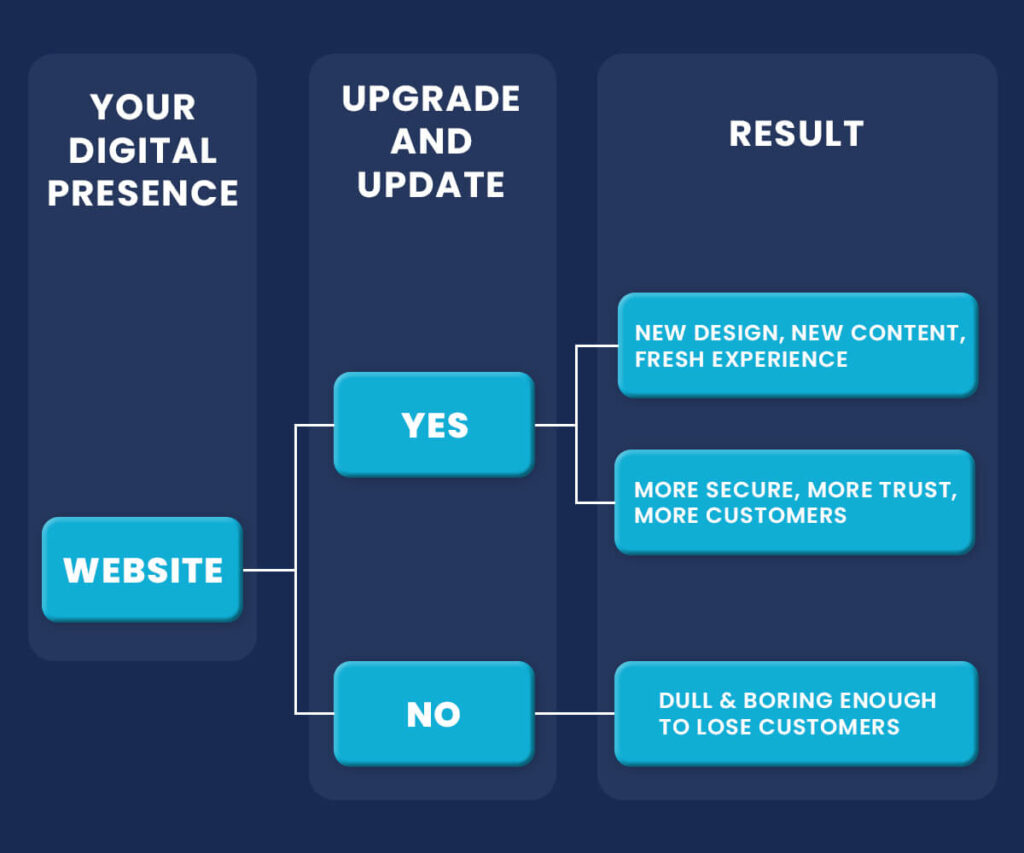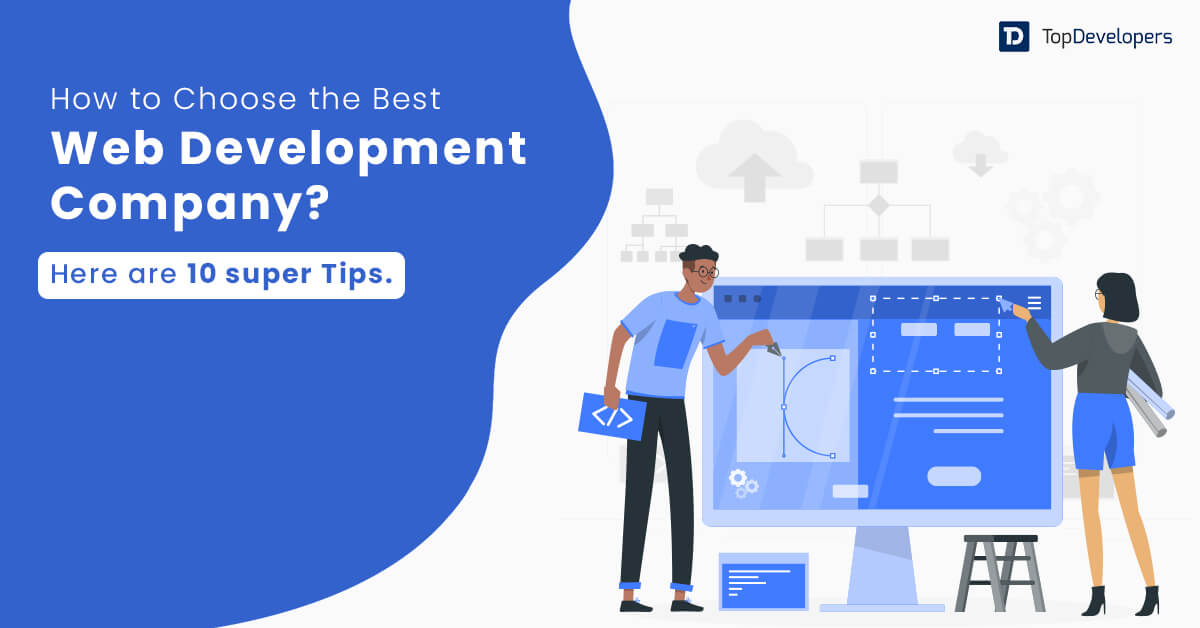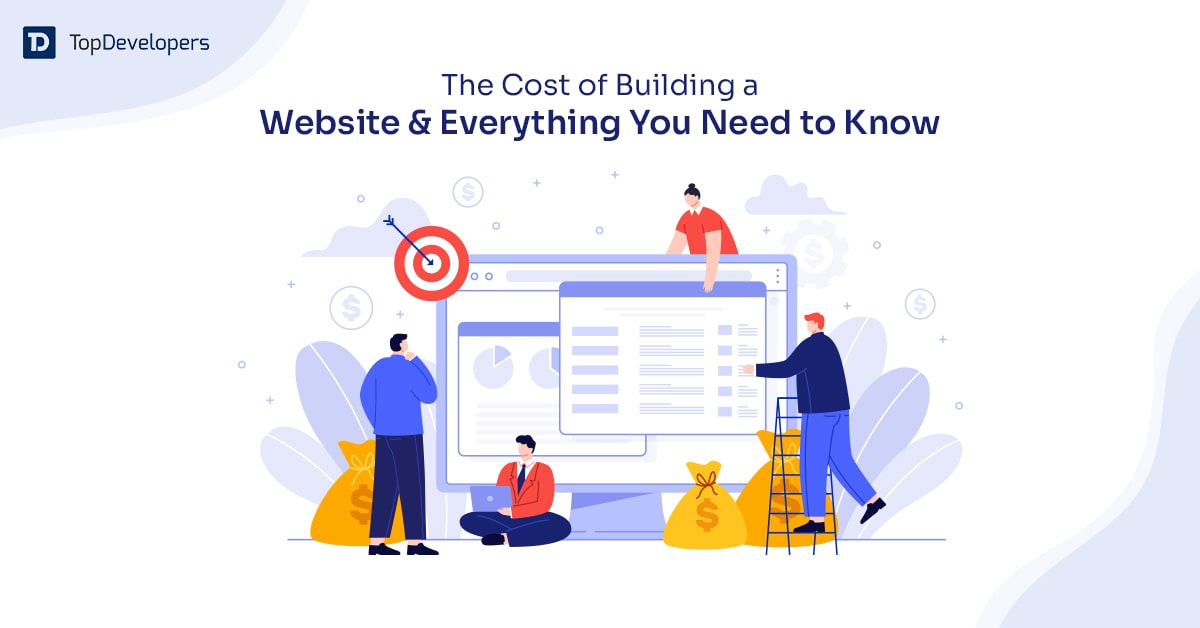
Your business website is the first impression that your potential customers have of your brand. It is also a powerful tool to showcase your products or services, communicate your value proposition, and generate leads or sales. According to Statista (January 2023), there were more than 5 billion internet users worldwide, and it accounts for approximately 64% of the global population.
Indeed, it is important to upgrade your business website regularly to keep up with the latest trends, technologies, and best practices. Web development companies can help to update your website to have terrific benefits such as:
- Improve end-user experience
- Increase your visibility on search engines
- Provide information about your product and service
- Awareness about your business and brand
- Enhance your security and performance, and
- Ultimately boost your conversion rate and revenue
Table of Contents
- Reasons to Update and Upgrade Your Website
- Provide Website Insights
- Enhanced Website Security
- Increasing User Engagement
- Mobile-First Design & Responsiveness
- Improve Website Performance
- Increase Conversion Rates
- Stay Ahead of Competitors
- Compliance With Legal Standards
- Adapt the Latest Technology
- Rebranding the Product, Service, or Company
- Meet Design Expectations and the Latest Design Trends
- The Loading Speed of Your Website
- Step up the Security Through Website Update
- Search Engine Optimization (SEO)
- Latest APIs to Enhance Functionalities
- Redefining User Experience (UX)
- High Bounce Rate
- Targeted Customers Not Achieved
- Keep Your Website Content Fresh
- Best Ways to Update Your Website
- Time to Stay Competitive
Reasons to Update and Upgrade Your Website
Updating your website is beneficial for your business in many ways. A website that is updated regularly can attract more visitors, achieve conversion goals, improve your search engine ranking, enhance your credibility, and showcase your latest products or services.
Updating your website can also help you fix any errors or bugs, improve the user experience, and increase the security of your data. A website that is outdated, slow, or broken can harm your reputation and drive away potential customers; hence, updating your website is a smart investment that can boost your business performance and growth.
Here are the top reasons why your website needs a booster dose of updates:
Provide Website Insights
In today’s data-driven world, understanding how your website performs is crucial for ongoing success. Regular website updates allow you to gather and analyze valuable insights into user behavior, site performance, and overall engagement. By using tools like Google Analytics, heatmaps, and session recordings, you gain a clear picture of how visitors interact with each page. These insights reveal which areas resonate with users, where they might face challenges, and how you can optimize the experience to retain their attention.
For instance, noticing a high bounce rate on a specific page could indicate an issue with content or layout. By identifying these problem areas through regular insights, you’re empowered to make data-driven updates that directly improve user engagement and site functionality. Regularly reviewing website analytics, such as page load speed, bounce rate, and top exit pages, ensures your website consistently performs at its best, meeting both user expectations and business goals.
Enhanced Website Security
Website security is a critical concern for any business, and regular updates play a significant role in protecting your site from potential threats. Each year, cyber-attacks become more sophisticated, targeting vulnerabilities in outdated plugins, themes, or CMS versions. Regular website updates help close these web security gaps, safeguarding sensitive data and ensuring a safe browsing experience for your visitors. Adding features like SSL certificates, firewalls, and multi-factor authentication further enhances your security framework. Keeping your website up-to-date builds trust with users, showing that your business takes data protection seriously.
Increasing User Engagement
User engagement is a key driver of conversions, and updating your website is one of the best ways to keep users interested and engaged. Regular updates allow you to refresh the design, introduce new content, and add interactive elements, all of which create a dynamic and appealing user experience. When visitors encounter fresh, relevant content, they’re more likely to spend time on your site and return in the future. Simple improvements, like improving page layout, adding user-friendly navigation, or incorporating new visuals, can significantly enhance website traffic and engagement and help build a loyal customer base.
Mobile-First Design & Responsiveness
With mobile users making up a large portion of website traffic, having a mobile-first design is essential. Updating your website to prioritize mobile responsiveness ensures that it functions seamlessly on any device. Google also favors mobile-friendly websites, so these updates can boost your search engine rankings. A responsive, mobile-first website design provides a consistent user experience, improving accessibility and satisfaction for all visitors, whether they’re on a desktop, tablet, or smartphone. By optimizing for mobile, you’re not only meeting user expectations but also supporting SEO efforts.
Improve Website Performance
Website performance is directly tied to user satisfaction and search engine rankings. Slow loading times, outdated media files, and bulky code can frustrate users, leading to higher bounce rates and lost conversions. Regularly updating your website helps address these issues by optimizing images, compressing files, and refining code. These improvements reduce loading times and create a smoother browsing experience. A fast, high-performing website keeps users engaged, builds credibility, and can even boost SEO, as search engines favor sites with efficient performance.
Increase Conversion Rates
A well-maintained, updated website directly influences your conversion rates. By analyzing user behavior and adapting your site to meet their needs, you create a more compelling and user-friendly experience. Regular updates can include refining your call-to-action buttons, simplifying forms, website redesigning, or enhancing the checkout process. These changes remove friction points in the user journey, encouraging visitors to complete desired actions, whether that’s signing up, purchasing, or contacting you. Investing in regular website updates creates a path to higher conversions and stronger business outcomes.
Stay Ahead of Competitors
Keeping your website fresh and up-to-date helps you maintain a competitive edge. As markets evolve, user expectations shift, and new web design trends emerge, ensuring your site reflects the latest standards is essential. Competitor analysis tools can provide insights into what’s working for similar businesses, allowing you to incorporate new strategies and stay relevant. By actively updating your website, you showcase your commitment to innovation and establish your brand as an industry leader, setting yourself apart from competitors who may lag in adopting changes.
Compliance With Legal Standards
Legal standards and regulations for websites are constantly evolving. Regular updates help ensure compliance with current requirements, such as GDPR, ADA, and other data privacy laws. For instance, updating your website’s accessibility features not only broadens your audience but also prevents potential legal issues. Compliance updates might include adding alt text to images, enabling keyboard navigation, and revisiting your privacy policy. Maintaining these standards builds trust with your audience and demonstrates your business’s commitment to providing an inclusive, legally compliant online experience.
Adapt the Latest Technology
Upgrading a website with the latest technology can bring many advantages to businesses and customers. Three primary benefits to upgrading a website with the latest technologies are:
- Improved performance and security: the latest technology can make a website faster, more responsive, and more secure from cyberattacks.
- Enhanced user experience and engagement: integrating contemporary technology into your website can offer a better design, functionality, and accessibility for a website, making it more attractive and user-friendly for customers.
- Increased visibility and conversion: you can optimize a website for search engines and social media platforms, making it more visible and reachable to potential customers.
Rebranding the Product, Service, or Company
Updating and upgrading your business website can help rebrand the company by enhancing its online presence, attracting new customers, and showcasing its values and vision. A website is often the first impression that a potential client has of a company, so it is important to keep it updated with relevant information, appealing design, and user-friendly features.
Upgrading a website can improve its performance, security, and compatibility with different devices and browsers. By improving a business website, a company can rebrand itself as a modern, innovative, and trustworthy partner for its target market.
Meet Design Expectations and the Latest Design Trends
Your website design is more than just a visual representation of your brand. It is also a powerful tool to communicate your value proposition, engage your audience, and drive conversions. However, the web design landscape is constantly evolving, and what worked a few years ago may not be effective today. That’s why you need to update your website design to meet the latest modern web design trends.
You can improve user experience by following website redesigning tips. A few tips include adopting responsive design, intuitive navigation, clear calls to action, and fast loading speed. Also, increase your conversion rate and revenue by using persuasive design elements such as color psychology through contrast and whitespace.
The Loading Speed of Your Website
Loading speed is one of the most important factors that affect the performance and user experience of your website. A slow-loading website can frustrate your potential customers, reduce your conversion rates, and harm your search engine rankings.
It is for that very reason you need to update your website for faster loading speed by optimizing your images; additionally, others also prefer minifying code and using a content delivery network (CDN). Overall, you can improve your website’s speed, usability, and credibility and, therefore, ultimately boost your business growth.
Step up the Security Through Website Update
Website upgrades and updates are essential for maintaining the performance, functionality, and security of your site. However, they also pose some risks that you need to be aware of and prepare for. For example, regular website updates may handle new vulnerabilities, compatibility issues, or configuration errors that could compromise your site’s security.
Additional tip: It is worth noting that hackers may also take advantage of the downtime or the changes in your website to launch cyberattacks or exploit weaknesses. Therefore, you need to step up your security measures before, during, and after the upgrade or website update process.
Search Engine Optimization (SEO)
Updating your website for SEO is essential to increase your online visibility and reach more potential customers. Search Engine Optimization makes your website more relevant and user-friendly for search engines like Google or Bing. By following SEO best practices, you can improve your website’s ranking on the search results page and drive more organic traffic to your website.
With a website update for SEO, you can:
- Target specific keywords and phrases to match your customers’ intent and needs
- Enhance your website’s usability and performance
- Reduce bounce rates and increase conversions
- Build trust and credibility with your website visitors
- Stay ahead of your competitors by adapting to the changing algorithms and trends of search engines
Updating your website for SEO is not a one-time task, but an ongoing process that requires constant monitoring and improvement. If you want to grow your online presence and achieve your business goals, you should update your website for SEO regularly. Furthermore, you can hire the best SEO agency with experience who can help you with your website update by optimizing it and making it SEO-friendly.
Latest APIs to Enhance Functionalities
A website update for the latest APIs is essential to enhance its functionalities and performance. APIs are the interfaces that allow your website to communicate with other applications and services, such as payment gateways, analytics tools, etc.
By using the latest APIs, you can ensure that your website is compatible with the most recent features and standards of these applications and services. As a result, your website can offer a seamless and secure user experience. Update your website with the latest APIs will provide you with these benefits:
- Speed
- Reliability
- Scalability
- Security
- Reduced maintenance costs
- Few errors
Mobile Website vs Mobile App- What is the best option for your business?
Redefining User Experience (UX)
The website upgrade is crucial for enhancing the overall user experience because it can improve the performance, security, design, and functionality of your website. A website that is fast, reliable, attractive, and user-friendly can attract more visitors by increasing engagement, and as a result, there is a boost in conversions.
Regular website upgrades can also help you keep up with the latest trends and technologies in web development, as well as comply with the best practices and standards for web accessibility and SEO. By updating your website regularly, you can ensure that your website meets the needs and expectations of your target audience and delivers a positive user experience.
High Bounce Rate
Website updates are important for reducing the high bounce rate, which is the percentage of visitors who leave your site after viewing only one page. A high bounce rate indicates your website is not engaging, relevant, or user-friendly enough to retain your audience’s attention.
Updating your website can help you improve your site’s design, content, performance, and functionality – this all enhances your visitors’ experience and encourages them to explore more pages on your site. A website update can also boost your site’s SEO ranking, which can increase your organic traffic and conversions.
Targeted Customers Not Achieved
Website update is justified if targeted customers are reached and increased. A website that is outdated, slow, or broken can deter potential customers from engaging with the business or trusting its products or services.
Updating a business website can improve the site’s performance, security, and SEO ranking, which can lead to more organic traffic and conversions in the long run.
Keep Your Website Content Fresh
Some enterprises simply update their website to keep content fresh because it can improve performance, security, and user experience. Updating your website content can also help you rank higher on search engines, attract more visitors, and increase conversions. A website that is updated regularly with new and informative content helps visitors show that they care about customers’ needs. Providing valuable content increases your online presence and reputation among peers.
Best Ways to Update Your Website
Keeping your website updated isn’t just about adding new content—it’s about optimizing every aspect to enhance user experience, security, and functionality. Implementing regular updates helps ensure your site meets evolving standards and user expectations. Here are five effective, actionable steps to keep your website running smoothly, engaging visitors, and staying competitive.
Refresh Content Regularly
Update blog posts with new data, add fresh articles, or enhance service pages with recent developments. Make it a routine to review content for relevance and accuracy every few months. This keeps information current and signals to search engines that your website is actively maintained.
Optimize for Mobile and Accessibility
Test your website on multiple devices to ensure it’s responsive. Resize images, adjust the layout for small screens and check for mobile-friendly navigation. Implement accessibility features like alt text for images, keyboard navigation, and color contrast adjustments to make sure everyone can use your site effectively.
Enhance Security Features
Regularly install updates for CMS software, plugins, and themes to close security gaps. Add extra layers of security, such as two-factor authentication and SSL certificates, to protect data. Run website security scans periodically to catch vulnerabilities before they become issues.
Improve SEO and Site Performance
Conduct an SEO audit to identify outdated keywords and improve meta tags, titles, and descriptions. Compress images, enable caching, and remove unnecessary plugins or code to increase loading speed. Regular SEO and performance checks help ensure your site ranks well and loads quickly for users.
Incorporate New Functionalities
Add features that enhance interactivity, like live chat, appointment booking, or social media integrations. For a more modern touch, consider adding Progressive Web App (PWA) capabilities, giving users an app-like experience on mobile devices. New functionalities make the website more engaging and user-friendly.
Time to Stay Competitive
An updated and upgraded website is important for your business because it can improve your online presence, attract more customers, and increase your sales. Also, an update of your website means that your website is secure, fast, and user-friendly.
You can add new features, functionalities, and design elements to your website with proper updates and upgrades. This can enhance your brand image and customer satisfaction; finally, by updating your website regularly, you can stay ahead of the competition and grow your business successfully.
 Avantika Shergil
| Nov 13, 2024
Avantika Shergil
| Nov 13, 2024
Avantika Shergil is a technology enthusiast and thought leader with deep expertise in software development and web technologies. With over 8 years of experience analyzing and evaluating cutting-edge digital solutions, Avantika has a knack for demystifying complex tech trends. Her insights into modern programming frameworks, system architecture, and web innovation have empowered businesses to make informed decisions in the ever-evolving tech landscape. Avantika is passionate about bridging the gap between technology and business strategy, helping businesses build customized software and website, and understand about different tools to leverage effectively for their ventures. Explore her work for a unique perspective on the future of digital innovation.









